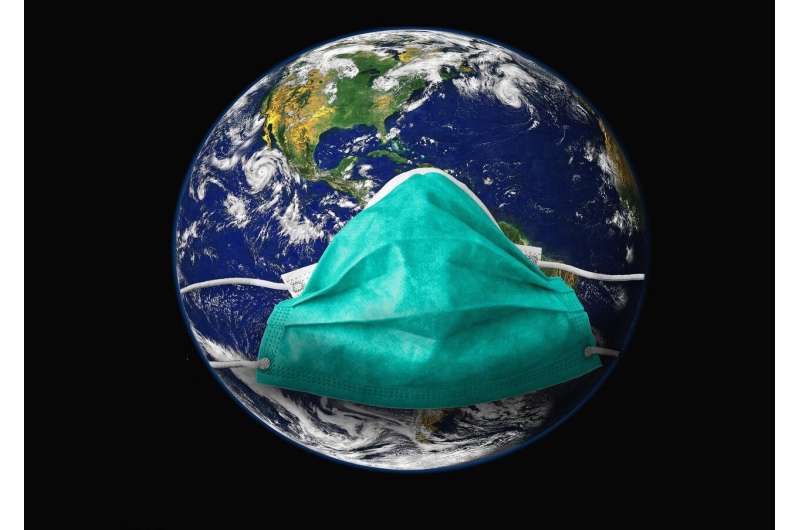Philly museums and med students band together to donate protective gear to front-line health-care providers

In the scramble to find PPE—personal protective equipment, an acronym unknown to most just a month ago—some unexpected groups have stepped up with donations to help out the area's hard-pressed hospitals, all of which say they are running critically short of protective gear.
Museums and art schools, it turns out, use PPE virtually daily in their conservation departments and to care for and create artworks.
Take Moore College of Art and Design, the venerable school just off Logan Square. When officials at the school heard about hospital shortages of such things as N95 respirator masks, gowns, and gloves—the essence of PPE—they knew they could help.
"We have an awesome school nurse," a Moore spokesperson said.
Because of that nurse, Moore happened to have a "pandemic supply" of goods stockpiled, according to the spokesperson.
Moore's cache of 200 N95 masks, used by doctors and nurses in the forefront of COVID-19 treatment, and 250 gowns will be going to Thomas Jefferson University Hospital, where the school sends ill or injured students in normal times.
Moore's faculty members are helping out with the effort, too, utilizing their unique skills. Nasheli Ortiz-Gonzalez, chair of fashion design, was contacted by a doctor, an acquaintance, who described dwindling supplies of simple yet critically important supplies.
She then formed an online sewing group, recorded a tutorial on how to make masks, and sewed 20 of them in two hours last Thursday. The masks will go to different hospitals.
At the University of Pennsylvania Museum, hard by the Penn Medicine cluster of buildings in West Philadelphia, as word of shortages spread, officials knew they had a stockpile of PPE stashed away.
"The head of conservation went down into the belly of the beast"—the museum's basement storage—"and basically gave them everything," said a museum spokesperson.
As a result, the Hospital of the University of Pennsylvania has received a powered air-pressure respirator, used by the museum in laser cleaning, plus 50 boxes of nitrile gloves, which offer advanced protection, a couple of pairs of goggles, 35 pairs of safety glasses, four boxes of N95 mask respirators, and one box of 8210 respirators. Add to that four partial boxes of gowns, and 20 older N95 masks.
Lynn Grant, the museum's head conservator, did some serious rummaging. The donations were delivered to HUP at the end of last week.
Anna Dhody, curator at the College of Physicians of Philadelphia's Mutter Museum, closed now for more than two weeks, returned to the building on South 22nd Street last week and gathered up 20 boxes of gloves, a pair of wrapped goggles, gowns, packages of hair nets, respirator cartridges, and a few full-body Tyvek suits.
Down in the basement conservation lab, she pulled out everything she could find that might be useful to hospitals.
"The hospitals need them more than we do right now," Dhody said. Rummaging around for quite a while, and making sure that the proper temperature and humidity were being maintained in specimen storage areas, she finally found three packages of N95 masks.
Dhody had hoped for more but realized that most who work in the Mutter conservation lab use their own respirators. Finding three made her "very excited."
"These are going to go to the front lines, to people who need them," Dhody said. "Hopefully, we can save some lives."
The cartload of supplies was picked up by Penn medical students at the end of last week. The med students have organized PPEnn PALS, a growing effort to gather supplies from across the region for donation to HUP, although the effort is almost certain to be broadened to include other facilities as the pandemic engulfs the region.
Charlotte Tisch, a first-year med student at Penn, studied Egyptian archaeology in college and was well-aware that art museums would most likely have supplies of masks, gloves, and other PPE mainstays.
She hit pay dirt at the Philadelphia Museum of Art, the Barnes Foundation, and the Pennsylvania Academy of the Fine Arts. These institutions contributed a significant supply of masks, respirators, gloves, shoe covers, and Tyvek suits to front-line health-care workers at HUP.
As of last week, the students had solicited and delivered more than 5,650 face masks, 1,700-plus N95 respirators, more than 380 face shields and safety glasses, more than 500 boxes of gloves, and 1,100 pairs of sterile surgical gloves, according to Noa Erlitzki, a first-year student at Penn medical school and a leader of PPEnn PALS. Most of the supplies were donated by Penn labs, the Penn Museum, and area art institutions, she said.
"People are dying," Erlitzki said. "At Penn, the need is so urgent, the supply so low, that they've implemented radical mask policies." Masks are to be worn at all times, stored onsite, and reused over several days, she said. These masks are ordinarily for a single use.
PPEnn PALS is still seeking donations, as is a broad coalition of students from Penn, and Temple, Thomas Jefferson, and Drexel Universities, who have formed the Philadelphia Organization for Health Professions Students (POHPS). POHPS has more than 2,000 area medical students, all focused on combating COVID-19 in a variety of ways.
"We all want to help out during this crisis," Tisch said. "Through my background in museum conservation, I know museums have PPE and hoped they'd consider helping out. We have been overwhelmed and humbled by their generosity. Their willingness to prioritize the needs of health-care workers and their communities is inspiring. I hope museums in other cities will follow suit."
©2020 The Philadelphia Inquirer
Distributed by Tribune Content Agency, LLC.



















